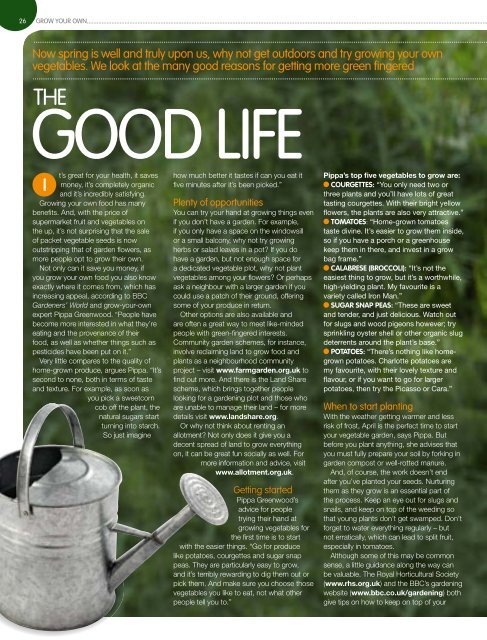Download this issue - Foresters Friendly Society
Download this issue - Foresters Friendly Society
Download this issue - Foresters Friendly Society
- No tags were found...
You also want an ePaper? Increase the reach of your titles
YUMPU automatically turns print PDFs into web optimized ePapers that Google loves.
26 GROW YOUR OWNNow spring is well and truly upon us, why not get outdoors and try growing your ownvegetables. We look at the many good reasons for getting more green fingeredTHEGOOD LIFEt’s great for your health, it savesmoney, it’s completely organicIand it’s incredibly satisfying.Growing your own food has manybenefits. And, with the price ofsupermarket fruit and vegetables onthe up, it’s not surprising that the saleof packet vegetable seeds is nowoutstripping that of garden flowers, asmore people opt to grow their own.Not only can it save you money, ifyou grow your own food you also knowexactly where it comes from, which hasincreasing appeal, according to BBCGardeners’ World and grow-your-ownexpert Pippa Greenwood. “People havebecome more interested in what they’reeating and the provenance of theirfood, as well as whether things such aspesticides have been put on it.”Very little compares to the quality ofhome-grown produce, argues Pippa. “It’ssecond to none, both in terms of tasteand texture. For example, as soon asyou pick a sweetcorncob off the plant, thenatural sugars startturning into starch.So just imaginehow much better it tastes if can you eat itfive minutes after it’s been picked.”Plenty of opportunitiesYou can try your hand at growing things evenif you don’t have a garden. For example,if you only have a space on the windowsillor a small balcony, why not try growingherbs or salad leaves in a pot? If you dohave a garden, but not enough space fora dedicated vegetable plot, why not plantvegetables among your flowers? Or perhapsask a neighbour with a larger garden if youcould use a patch of their ground, offeringsome of your produce in return.Other options are also available andare often a great way to meet like-mindedpeople with green-fingered interests.Community garden schemes, for instance,involve reclaiming land to grow food andplants as a neighbourhood communityproject – visit www.farmgarden.org.uk tofind out more. And there is the Land Sharescheme, which brings together peoplelooking for a gardening plot and those whoare unable to manage their land – for moredetails visit www.landshare.org.Or why not think about renting anallotment? Not only does it give you adecent spread of land to grow everythingon, it can be great fun socially as well. Formore information and advice, visitwww.allotment.org.uk.Getting startedPippa Greenwood’sadvice for peopletrying their hand atgrowing vegetables forthe first time is to startwith the easier things. “Go for producelike potatoes, courgettes and sugar snappeas. They are particularly easy to grow,and it’s terribly rewarding to dig them out orpick them. And make sure you choose thosevegetables you like to eat, not what otherpeople tell you to.”Pippa’s top five vegetables to grow are:Courgettes: “You only need two orthree plants and you’ll have lots of greattasting courgettes. With their bright yellowflowers, the plants are also very attractive.”tomatoes: “Home-grown tomatoestaste divine. It’s easier to grow them inside,so if you have a porch or a greenhousekeep them in there, and invest in a growbag frame.”Calabrese (broCColi): “It’s not theeasiest thing to grow, but it’s a worthwhile,high-yielding plant. My favourite is avariety called Iron Man.”sugar snap peas: “These are sweetand tender, and just delicious. Watch outfor slugs and wood pigeons however; trysprinkling oyster shell or other organic slugdeterrents around the plant’s base.”potatoes: “There’s nothing like homegrownpotatoes. Charlotte potatoes aremy favourite, with their lovely texture andflavour, or if you want to go for largerpotatoes, then try the Picasso or Cara.”When to start plantingWith the weather getting warmer and lessrisk of frost, April is the perfect time to startyour vegetable garden, says Pippa. Butbefore you plant anything, she advises thatyou must fully prepare your soil by forking ingarden compost or well-rotted manure.And, of course, the work doesn’t endafter you’ve planted your seeds. Nurturingthem as they grow is an essential part ofthe process. Keep an eye out for slugs andsnails, and keep on top of the weeding sothat young plants don’t get swamped. Don’tforget to water everything regularly – butnot erratically, which can lead to split fruit,especially in tomatoes.Although some of <strong>this</strong> may be commonsense, a little guidance along the way canbe valuable. The Royal Horticultural <strong>Society</strong>(www.rhs.org.uk) and the BBC’s gardeningwebsite (www.bbc.co.uk/gardening) bothgive tips on how to keep on top of your
















